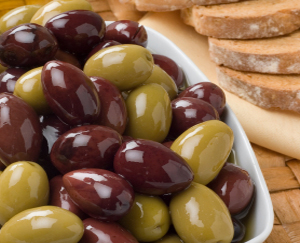- By Maureen Williams, ND
After Menopause, Mediterranean Diet Provides Breast Cancer Protection
The traditional Mediterranean diet, with its emphasis on seafood, olive oil, legumes, nuts, and fruits and vegetables, has long been promoted as heart-healthy. Early evidence has suggested that this way of eating might also prevent some types of cancer, including breast cancer. A new study lends support for the diet’s anticancer benefits, finding that postmenopausal women living in Greece whose diets closely match the traditional Mediterranean diet have a lower risk of breast cancer.
Olive oil is an excellent base for salad dressings
Classifying a traditional Mediterranean diet
The study, published in the American Journal of Clinical Nutrition, followed 14,807 women for an average of 9.8 years. All of the women filled out diet questionnaires at the beginning of the study and their diets were scored according to how closely their eating habits matched the characteristics of a traditional Mediterranean diet. The researchers based their nine-point scoring system on the following factors:
- High consumption of seafood, legumes, fruits and nuts, vegetables, and cereals
- High ratio of dietary monounsaturated fats (such as those in olive oil) to saturated fats (such as those in animal products)
- Low consumption of dairy products and meats
- Moderate alcohol consumption
Diet matters after menopause
Postmenopausal women in the study with scores that indicated close adherence to a Mediterranean diet had a lower risk of breast cancer than those with low scores. Every two points of increase in score reduced breast cancer risk by 22%. Breast cancer risk in pre- and perimenopausal women, however, was not affected by the Mediterranean diet.
“We have found evidence that conformity to the traditional Mediterranean diet may be associated with lower breast cancer risk in postmenopausal women and could explain, in part, the lower incidence of this disease in Mediterranean countries,” the study’s authors said. “Overall, approximately 10% of breast cancer cases…could be avoided if all women shifted their diet toward one adhering more closely to the Mediterranean dietary pattern.”
Get a Mediterranean makeover
Here are some ways to make your diet more Mediterranean:
- Switch to olive oil. Olive oil is an excellent base for salad dressings, is nice drizzled on whole grain pasta or rice, and can even tolerate moderate cooking heat.
- Make nuts and seeds part of your daily diet. They make excellent snacks, and can be used as toppings on whole grain cereals and salads.
- Replace some of your meat. Try beans or lentils, and have some fresh seafood once to twice per week if you can.
(Am J Clin Nutr doi:10.3945/ajcn.2010.29619)














